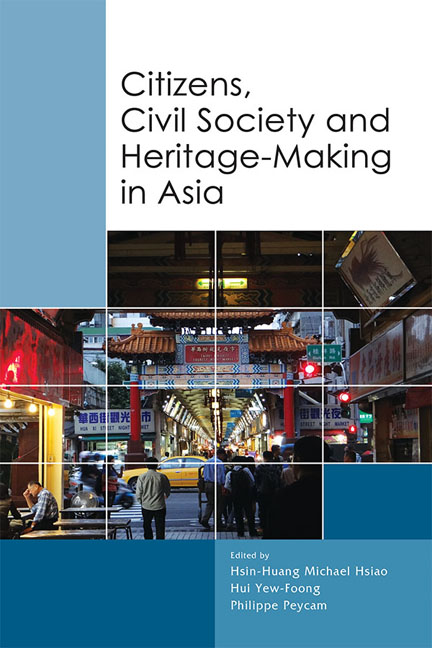Book contents
- Frontmatter
- Contents
- Contributors
- 1 Introduction: Finding the Grain of Heritage Politics
- 2 Heritage, Identity and Power
- 3 Heritage-Making and Post-coloniality in Yangon, Myanmar
- 4 Living Heritage of Ruins? Contesting the Paradox in Trowulan's Majapahit Heritage
- 5 The Reconstruction of Heritage in Rural Vietnam: An Analysis of State and Local Dynamics
- 6 Performing Cultures, Negotiating Identities: The Cultural Politics of Indigenous Cultural Villages in West Malaysia
- 7 Constituting Philippine Filmic and Linguistic Heritage: The Case of Filipino Regional Films
- 8 Encounter and Counter-Narratives of Heritage in Macau
- 9 Cultural Activities of the Chinese Community in Post-war Myanmar
- 10 Chinese Street Opera in Singapore: Heritage or a Vanishing Trade
- 11 Policy Formation and Civil Society Engagement in Heritage-Making in Taiwan: A Historical Examination
- 12 Becoming Taiwanese: Appropriation of Japanese Colonial Sites and Structures in Cultural Heritage-Making — A Case Study on the Wushantou Reservoir and Hatta Yoichi
- 13 Defining Culture in the Heritage Preservation of Taiwanese Veterans’ Villages: The Case of Zuoying
- 14 Tobacco Crop Memories in Taiwan: The Heritage of a Deadly Agriculture
- Index
8 - Encounter and Counter-Narratives of Heritage in Macau
Published online by Cambridge University Press: 03 January 2018
- Frontmatter
- Contents
- Contributors
- 1 Introduction: Finding the Grain of Heritage Politics
- 2 Heritage, Identity and Power
- 3 Heritage-Making and Post-coloniality in Yangon, Myanmar
- 4 Living Heritage of Ruins? Contesting the Paradox in Trowulan's Majapahit Heritage
- 5 The Reconstruction of Heritage in Rural Vietnam: An Analysis of State and Local Dynamics
- 6 Performing Cultures, Negotiating Identities: The Cultural Politics of Indigenous Cultural Villages in West Malaysia
- 7 Constituting Philippine Filmic and Linguistic Heritage: The Case of Filipino Regional Films
- 8 Encounter and Counter-Narratives of Heritage in Macau
- 9 Cultural Activities of the Chinese Community in Post-war Myanmar
- 10 Chinese Street Opera in Singapore: Heritage or a Vanishing Trade
- 11 Policy Formation and Civil Society Engagement in Heritage-Making in Taiwan: A Historical Examination
- 12 Becoming Taiwanese: Appropriation of Japanese Colonial Sites and Structures in Cultural Heritage-Making — A Case Study on the Wushantou Reservoir and Hatta Yoichi
- 13 Defining Culture in the Heritage Preservation of Taiwanese Veterans’ Villages: The Case of Zuoying
- 14 Tobacco Crop Memories in Taiwan: The Heritage of a Deadly Agriculture
- Index
Summary
At dusk, from the outer rim of Macau's Reservoir edging the Pearl River Delta, one can see the casino cluster on the opposite bank gradually light up, illuminating the darkening sky and projecting itself as a colourful sequin pattern over the still water. Next to it, a hill shrouded in darkness bears a solitary spot radiating a moving beam of light. Somewhat outshined by the LED panels and glittering signs that separate by a few hundred metres the casino district from the city's highest geographical point hosting one of its World Heritage sites, the Guia Lighthouse continues, nevertheless, to glow. This urban scene embodies the contrasting nature of struggles over space ensuing from Macau's drastic transformation over the last ten years. Materialized in this setting, the adjacent position of gambling and heritage is a powerful representation of the forces, complementary, but also uneven, which have marked their relationship throughout the integration of the Macau Special Administrative Region (SAR) into China. To some extent it signals the seemingly irreversible connection between the realization of capital and the (im)possibility of the social (cf. Bissell 2005: pp. 221–22). The ambivalences they evoke can, thus, be easily grasped in binaries, the old and the new, the colonial and the post-colonial, the past and the future — the latter of which carries the particular connotation in China that it can only be attained with the demise of the past (Zhang 2006). In this chapter, I argue that the relationship between the political economy of gambling and the emergence of “heritage” as a new cultural narrative of place in Macau is, however, multiple, claiming their striking opposition, rather than casting the invalidation of the social, acts as a catalyst for change.
In light — literally — of modern, extravagant and dominating structures over the cityscape, it is tempting to surrender to that mental construct of antinomies. Despite the fact that they hold true to some extent — a casino erected in 2008 is irrefutably new compared to an eighteenth century church — the processes these phenomena represent cannot be seen simply as a matter of the new replacing the old or the past succumbing to the future. As an economic activity, gambling is as old as some of Macau's historical sites and buildings, arguably older than many.
- Type
- Chapter
- Information
- Citizens, Civil Society and Heritage-Making in Asia , pp. 164 - 184Publisher: ISEAS–Yusof Ishak InstitutePrint publication year: 2017



